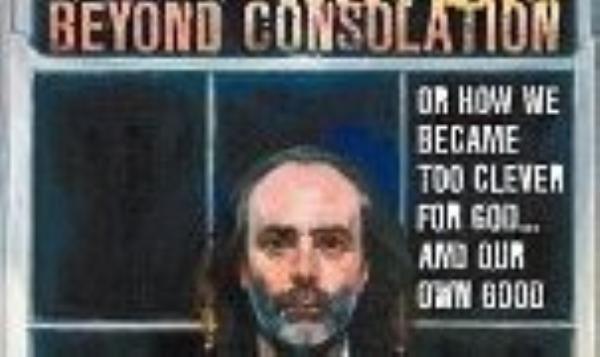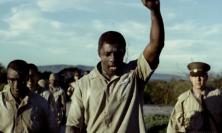Here is an unusual book. Going strongly against the prevailing tide, it is a stout defence of Christianity and the transcendent. It is not the Church, however, that John Waters is promoting, but rather the function that it plays in human society: that is, the provision of hope, construction of meaning, belief in an absolute and in living beyond death, and the foundation for behaving ethically. Though what Waters describes has many of its elements, it is not full blown Christianity either. Paradoxically, Waters holds back on the idea of a personal saviour in Christ and rejects the current model of Church, specifically the Irish Catholic one.
Although heavy going at times, Beyond Consolation is a heady mix of cultural analysis, philosophical reflection, personal testimony and theological musings. What is most significant about this book is the careful teasing out of the current blind spots in Irish culture. Waters names the rise of pseudo-science, the negative role of the media, the rejection of any religious dimension, and the glorification of youth and of the superficial. He then works through their consequences logically to reveal how they lead to a pessimistic nihilism. This hopelessness is what he identifies as the root of despair in modern Ireland. Waters goes on to offer his theory that a lot of contemporary ills, including OCD and depression, are likewise diseases of the spirit. He claims that the domination of the medical profession and the rise of specialists results in an overly narrow approach to treatment, failing to recognise the multi-dimensional and specifically transcendent nature of human beings. Allied to this is his blistering critique of the ‘mechanisation’ of the human being, the tendency to analyse and treat people as if they were machines. This is a real temptation in contemporary reductionist and materialist thinking.
It is the question of the transcendent, or what had traditionally been called ‘faith’, that really exercises Waters, though. Essentially, the whole book is geared toward the presentation of his take on Christianity. In his searing critique of Irish society and its rejection of the divine, Waters employs what would be termed a form of natural theology. He reflects on the world and on the nature of the 'real', as evidence for belief, meaning and God. Accordingly, the book is structured around a series of reflections on various TV interviews with some significant figures in Irish society. These include author Nuala O'Faolain, who was facing imminent death from cancer, poet Seamus Heaney, and President Mary McAleese. Like a philosopher, Waters uses ruthless logic to expose inconsistencies, reveal assumptions, and force conclusions.
While he is quite prophetic, pro-faith and frequently scathing of contemporary culture's materialist reductionism, he is far from being an apologist for the Church. Some of his strongest critique comes in the chapter on the Church and the abuse crises, entitled ‘The Gulag of Unhope’. Though he quotes extensively from Pope Benedict, he is also critical of the guardians of Christianity and how they have transmitted the message. It does leave him in a strange position, though: having made the case for Christianity and the need for God, he teeters on the edge of commitment to a concrete institution (like many people).
And this brings us to the central point. Waters only gets so far on his personal faith journey as he himself admits: he concedes the existence of God, the presence of beauty and the transcendent in life, but admits that he can't make the jump to a personal God. His is a more abstract belief, a close personal relationship with Christ apparently being beyond him. In some senses he is a victim of his own method, using logic and argument to illustrate the existence of the divine as a concept, but failing to make the affective ‘leap of faith’.
Waters does make some very perceptive comments about modern culture and its too quick trashing of religion, points that a lot of clergy and Religious would like to make right now but can’t. Chief among these are his views on the state’s role in supporting the institutions named in the Ryan report. Also significant is his exposé of a shallow culture of the ‘now’, closely tied to the excesses of consumerism. The commentaries on the pessimism and despair engendered by a pseudo-scientific rationalism, and the denial of the complexities of the human spirit, are equally perceptive. While not holding back on his critique of the Church, he recognises the need to preserve the transcendent and a belief in the absolute. He warns, however, against reducing religion to the role of providing cheap consolation in times of distress, and points to what an integrated religion would look like – something essential to all aspects of life.
Probably the thing that detracts most from this otherwise well-written book is the long-windedness and repetitive nature of it. There is a mixture of personal narrative, philosophical reflection, and theological musings. But these are not happily integrated in a way that makes them easy to read. Instead, one has to fight one’s way through dense and terse philosophical prose, interspersed with lighter moments of personal account. These latter are quite brave and endearing but one has to persevere to get to them. Waters’ mastery of language is excellent but the structure of the book could have been made far more fluid.
In many ways the book chronicles Waters’ search for the divine. It is a very able exploration of the semantics of desire; that is, putting words on human cravings and search for the infinite. He provides first rate descriptions of the paradox of the human condition: we are limited but somehow infinite. He arrives at a place where he can go no further, though, and hovers on the brink of fear and faith and all that goes with it. In many ways it is Waters’ personal faith journey that carries the entire edifice; it makes it real and engaging. The refusal or inability to go any further seems to be symptomatic of his whole approach. It is one that needs grounding and ‘incarnation (fleshing out)’. One is reminded of the phrase from another philosopher, Pascal: ‘the heart has its reasons of which reason knows nothing’.
The reviewer, Brendan McManus, is an Irish Jesuit priest and is chaplain to Coláiste Iognáid in Galway.






